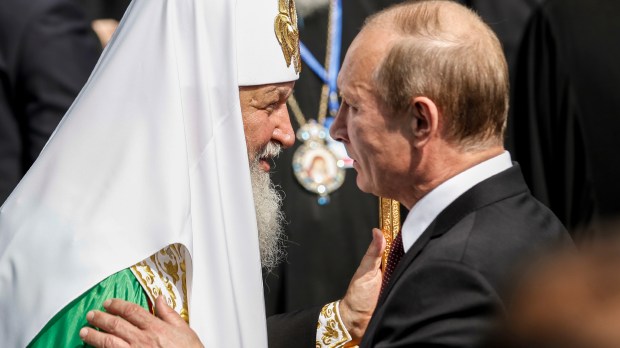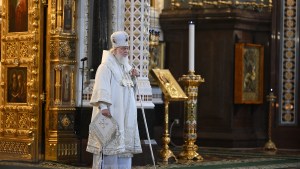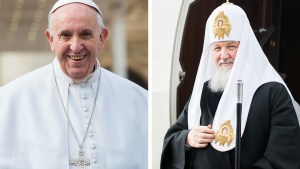Lenten Campaign 2025
This content is free of charge, as are all our articles.
Support us with a donation that is tax-deductible and enable us to continue to reach millions of readers.
Whether they feel the Russian Orthodox leader has any influence with President Vladimir Putin, or they are simply at wit’s end, Catholic and other Christian leaders are imploring Patriarch Kirill of Moscow and all Russia to try to get his friend in the Kremlin to stop the killing in Ukraine.
And some leaders in Kirill’s own Church are advocating independence from Moscow, with one priest even collecting signatures for a petition calling for an eccesiastical heresy trial for Kirill, who has voiced support for Putin’s invasion of Ukraine.
As much of the Christian world celebrates Easter Week, and Orthodox Christians observe Holy Week, Ukraine is expected to see an intensification of suffering in the holy days leading up to Orthodox Easter.
Russian forces on Tuesday launched a new campaign, attempting to secure the eastern Ukrainian regions of Donetsk and Luhansk, where Kremlin-backed separatists have waged a war for independence since 2014. And the Russian military has closed in on one of the last bastions of Ukrainian resistance in Mariupol, the southern port city that would give Moscow a land bridge connecting the Donbas with Russian-occupied Crimea. The mayor of Mariupol has estimated that civilian deaths in the besieged city could exceed 20,000.
Referring to the death of such civilians and other suffering that has taken place across Ukraine, the Catholic bishops of Scotland are among the latest religious voices to appeal to Kirill for helping in ending the suffering.
In a letter signed by the president of the bishops’ conference of Scotland, Bishop Hugh Gilbert, the bishops of the country this week called on Kirill to intervene with Putin to “bring the tragedy of Ukraine to an end,” the Tablet reported. They pointed out that the “beauty and power” of the Orthodox faith included its “message of peace.”
Then, on Wednesday, the World Council of Churches issued its second appeal to Kirill, asking that he use his spiritual authority to call for a ceasefire in Ukraine for Orthodox Easter.
“People lost their trust and hope in politicians and in a possible peaceful negotiation and a ceasefire,” said Father Ioan Sauca, acting secretary general of the World Council of Churches, in an April 19 letter to the Russian hierarch.
Sauca expressed concern about rumored plans afoot “to attack churches during the Easter night celebrations and to spread even more terror, fear, mutual accusations, and demonization.”
Pope Francis also appealed to the Russian Orthodox leader when he held an online meeting with Kirill in March. The pontiff rejected the justifications for the invasion as a “holy war,” saying “today we cannot speak like this.”
An in-person meeting that had been rumored before Putin’s invasion began on February 24 apparently was shelved. But Reuters news agency earlier this month reported that the Vatican was still considering such an encounter, which would be only the second between the Catholic and Orthodox hierarchs. The wire service cited two Vatican sources saying it was possible that Francis’ June visit to Lebanon might add a side trip to Jerusalem to meet with Kirill.
“One source said the trip appeared to be almost certain, while the other said it was one possibility,” Reuters said April 11.
World Council of Churches
Shortly after the invasion began, the World Council of Churches’ Father Sauca sent an open letter to Kirill, urging him to mediate so that the attack might be stopped.
But Sauca, a Romanian Orthodox priest, has resisted calls to expel the Moscow Patriarchate from the WCC for its apparent support of — or at least failure to condemn — the war, saying that such a decision would be that of the WCC’s central committee.
Asked for his personal opinion, Sauca said, “Things are very complicated these days and we live in a turning point of history. As many others, I suffer a lot, in particular as an Orthodox priest since I am aware that both in Russia and in Ukraine the Orthodox Churches have great numbers of faithful. And the tragic events, the great suffering, death and destruction are in deep contradiction with Orthodox theology and spirituality, with what our forefathers and mothers have showed us through their personal lives in history.
“I will not stop speaking against any aggression, invasion or war; I will continue being prophetic but I will do my best to keep the WCC what it was meant to be and to keep the table of dialogue open,” Sauca continued. “Because if we exclude those that we do not like or do not agree with, with whom are we going to speak, how can we advance to reconciliation and lasting just peace?”
Roundly criticized
Criticism of the WCC’s failure to evict the Russian Orthodox Church comes from sources such as Czech theologian Pavel Cerný, who wrote in March that the ROC has long sought to use the WCC for its own purposes. Cerný cited Kirill’s support for the war and said that “the ROC should not be permitted to continue as a WCC member until it turns away from this false path of religious nationalism.”
Also in March, Rev. Rob Schenck, an evangelical Christian who heads the Dietrich Bonhoeffer Institute in Washington, D.C., called on the WCC to sanction Kirill and referred to him as “a propaganda tool for Putin.”
Even former Archbishop of Canterbury Rowan Williams said there is a “strong case” for removing the ROC from the WCC.
“When a Church is actively supporting a war of aggression, failing to condemn nakedly obvious breaches in any kind of ethical conduct in wartime, then other Churches do have the right to raise the question and challenge the Church and to say, ‘Unless you can say … something recognizably Christian about this, we have to look again at your membership,'” Williams told the BBC.
Russian World
In September 1971, while still a priest, Kirill, thought to have been a KGB asset in the Soviet Union, was posted as a representative of the Russian Orthodox Church to the World Council of Churches in Geneva. He has been actively involved in the ecumenical activity of the Russian Orthodox Church since then. From 1975 to 1998, he was a member of the Central and Executive Committees of the WCC.
In recent years, Kirill has pushed a theory known as Russkiy Mir, which, according to a declaration drafted by the Orthodox Christian Studies Center at Fordham University, states that there is a “transnational Russian sphere or civilization, called Holy Russia or ‘Holy Rus,’ which includes Russia, Ukraine and Belarus (and sometimes Moldova and Kazakhstan), as well as ethnic Russians and Russian-speaking people throughout the world. It holds that this ‘Russian world’ has a common political center (Moscow), a common spiritual center (Kyiv as the ‘mother of all Rus’), a common language (Russian), a common Church (the Russian Orthodox Church, Moscow Patriarchate), and a common patriarch (the Patriarch of Moscow), who works in ‘symphony’ with a common president/national leader (Putin) to govern this Russian world, as well as upholding a common distinctive spirituality, morality, and culture.”
“The painful truth, but one that we need to confront in this time of repentance, is that our own leadership, and specifically, the leadership of the Russian Orthodox Church, has developed and promoted a false teaching known as ‘Russkii Mir’ or ‘Russian World,’ providing Mr. Putin with the religious ‘blank check’ that underwrites his heinous invasion and annexation of Russia’s peaceful, democratic neighbors: Ukraine,” said the Fordham Study Center.
Although an Orthodox Church loyal to Moscow exists in Ukraine side by side with the autocephalous Orthodox Church of Ukraine, which is loyal to a primate in Kyiv, Putin’s war and Kirill’s apparent support of it has angered many priests and faithful of the Ukrainian Orthodox Church of the Moscow Patriarchate (UOC-MP). Since the invasion began, 17 of the 43 eparchies of the UOC-MP have stopped praying for Kirill by name during the Divine Liturgy, according to Ukrainian Catholic University professor Anatolii Babynskyi, writing in The Pillar.
“On April 10, Fr. Andrii Pinchuk from the suburbs of Dnipro in eastern Ukraine began collecting signatures of UOC-MP priests, for an appeal that requests the primates of the ancient Orthodox Churches convene an inter-church court over Patriarch Kirill of Moscow’s support for the invasion, which Pinchuk and other signers consider to be heresy,” Babynskyi wrote.
“It’s very hard to get inside his head, but I think that he really believes in some of those casus belli of Russia,” Babynskyi told Aleteia in March. “I think he really believes there are some neo-Nazis here in Ukraine, and they need to restore this Russian World and free Ukrainians from Western colonization or something like that. I think he believes in this propaganda that Russia is spreading around the world.”



